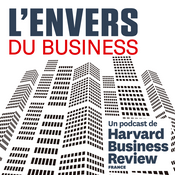2081 épisodes
- We meet Melanie Perkins, the CEO and co-founder of graphic design platform Canva, which has hundreds of millions of users and a valuation of nearly $40 billion.
Despite her immense wealth, Melanie Perkins says the label “billionaire” has never felt quite right. Instead, she plans to give away most of her fortune during her lifetime. She also tells us why she believes young people should be educated differently to adapt to the growth of AI.
If you'd like to get in touch with the team, our email address is [email protected]
Presenter: Zoe Kleinman
Producer: Philippa Wain
Sound mix: Toby James
Business Daily is the home of in-depth audio journalism devoted to the world of money and work. From small startup stories to big corporate takeovers, global economic shifts to trends in technology, we look at the key figures, ideas and events shaping business.
Each episode is a 17-minute deep dive into a single topic, featuring expert analysis and the people at the heart of the story.
Recent episodes explore the weight-loss drug revolution, the growth in AI, the cost of living, why bond markets are so powerful, China's property bubble, and Gen Z's experience of the current job market.
We also feature in-depth interviews with company founders - like Melanie Perkins - and some of the world's most prominent CEOs. These include Google's Sundar Pichai, Wikipedia founder Jimmy Wales, and the CEO of Starbucks, Brian Niccol.
(Picture: Melanie Perkins speaking at a conference in 2024. Credit: Getty Images) - In just a few months, the country has signed or advanced several major trade deals with other nations.
Is it a reflection of the growing size of the Indian economy - it is on course to become the third largest in the world - or it is because of a global economic realignment due to US President Donald Trump's tariff policies?
And is India ready to open its markets to foreign competition, or is there a danger that it will lead to job losses in some sectors?
If you'd like to get in touch with the team, our email address is [email protected]
Presenter: Rahul Tandon
Producer: David Cann
Business Daily is the home of in-depth audio journalism devoted to the world of money and work. From small startup stories to big corporate takeovers, global economic shifts to trends in technology, we look at the key figures, ideas and events shaping business.
Each episode is a 17-minute deep dive into a single topic, featuring expert analysis and the people at the heart of the story.
Recent episodes explore the weight-loss drug revolution, the growth in AI, the cost of living, why bond markets are so powerful, China's property bubble, and Gen Z's experience of the current job market.
We also feature in-depth interviews with company founders and some of the world's most prominent CEOs. These include Google's Sundar Pichai, Wikipedia founder Jimmy Wales, and the CEO of Starbucks, Brian Niccol.
(Picture: Prime Minister Narendra Modi meets President of the European Council, Antonio Luis Santos da Costa and President of the European Commission, Ursula von der Leyen in Hyderabad House, New Delhi, India on the 27th of January 2026. Credit: Getty Images) - We’re in France, where traditional eateries, bistros, and brasseries, once a huge part of the economy, as well as the culture of the country, are disappearing fast.
A few years ago, if you drove through France, you’d come across dozens of little restaurants. Now, in many small towns, you’ll only find a boulangerie and a takeaway. Restaurants serving traditional French food like steak and chips or coq au vin are closing at a rate of about 25 a day. The main problem: they’ve become too expensive.
If you'd like to get in touch with the team, our email address is [email protected]
Presented and produced by John Laurenson
Sound mix: Toby James
Business Daily is the home of in-depth audio journalism devoted to the world of money and work. From small startup stories to big corporate takeovers, global economic shifts to trends in technology, we look at the key figures, ideas and events shaping business.
Each episode is a 17-minute deep dive into a single topic, featuring expert analysis and the people at the heart of the story.
Recent episodes explore the weight-loss drug revolution, the growth in AI, the cost of living, why bond markets are so powerful, China's property bubble, and Gen Z's experience of the current job market.
We also feature in-depth interviews with company founders and some of the world's most prominent CEOs. These include Google's Sundar Pichai, Wikipedia founder Jimmy Wales, and the CEO of Starbucks, Brian Niccol.
(Picture: Tables and chairs in a village square in Provence, France. Credit: Getty Images) - We’re in Toronto in Canada, North America's second-biggest financial centre after New York, where so-called ethical investing has become big business, with many investors choosing funds they believe are better for people and the planet. But amid growing concerns about misleading environmental claims, it can be hard to know what’s genuinely ethical and what’s just clever marketing.
We explore how politics is reshaping corporate commitments and hear from campaigners and regulators working to crack down on financial greenwashing.
If you wouild like to get in touch with the team, our email address is [email protected]
Presenter: Megan Lawton
Producer: Sam Gruet
Business Daily is the home of in-depth audio journalism devoted to the world of money and work. From small startup stories to big corporate takeovers, global economic shifts to trends in technology, we look at the key figures, ideas and events shaping business.
Each episode is a 17-minute deep dive into a single topic, featuring expert analysis and the people at the heart of the story.
Recent episodes explore the weight-loss drug revolution, the growth in AI, the cost of living, why bond markets are so powerful, China's property bubble, and Gen Z's experience of the current job market.
We also feature in-depth interviews with company founders and some of the world's most prominent CEOs. These include Google's Sundar Pichai, Wikipedia founder Jimmy Wales, and the CEO of Starbucks, Brian Niccol.
(Photo: Sustainability consultant Lindsay Hampson works with companies around the world, helping them navigate ESG frameworks. Credit: Jon Evans) - We go right to the cutting edge of food production and glimpse into the future of farming.
Farmers are increasingly using artificial intelligence-powered machines to try to maximise their crops and reduce their spiralling costs.
We speak to farmers, those behind the AI systems, and hear concerns about the growing use of automation in agriculture.
If you'd like to get in touch with the team, our email address is [email protected]
Presented and produced by Rob Young
Business Daily is the home of in-depth audio journalism devoted to the world of money and work. From small startup stories to big corporate takeovers, global economic shifts to trends in technology, we look at the key figures, ideas and events shaping business.
Each episode is a 17-minute deep dive into a single topic, featuring expert analysis and the people at the heart of the story.
Recent episodes explore the weight-loss drug revolution, the growth in AI, the cost of living, why bond markets are so powerful, China's property bubble, and Gen Z's experience of the current job market.
We also feature in-depth interviews with company founders and some of the world's most prominent CEOs. These include Google's Sundar Pichai, Wikipedia founder Jimmy Wales, and the CEO of Starbucks, Brian Niccol.
(Picture: Farmer inspects humidity of sunflower crops with AI driven software on laptop at dusk. Credit: Getty Images)
Plus de podcasts Business
Podcasts tendance de Business
À propos de Business Daily
The daily drama of money and work from the BBC.
Site web du podcastÉcoutez Business Daily, BFM Bourse ou d'autres podcasts du monde entier - avec l'app de radio.fr

Obtenez l’app radio.fr gratuite
- Ajout de radios et podcasts en favoris
- Diffusion via Wi-Fi ou Bluetooth
- Carplay & Android Auto compatibles
- Et encore plus de fonctionnalités
Obtenez l’app radio.fr gratuite
- Ajout de radios et podcasts en favoris
- Diffusion via Wi-Fi ou Bluetooth
- Carplay & Android Auto compatibles
- Et encore plus de fonctionnalités


Business Daily
Scannez le code,
Téléchargez l’app,
Écoutez.
Téléchargez l’app,
Écoutez.








































